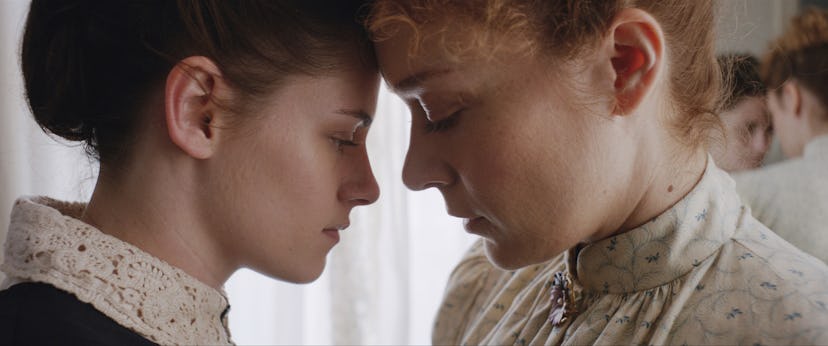At Sundance 2018, Chloë Sevigny Outshines Everyone as Lizzie Borden, Even Her Screen Lover Kristen Stewart
After the opening weekend, it’s clear that Sundance 2018 has a lot of great performances—even if in uneven movies.

At the Sundance Film Festival, the pain (bad movies, bad weather) make the pleasures better. After the opening weekend, the greatest delights so far have come from actors giving career-turning performances in films of varying quality: Chloë Sevigny and Kristen Stewart in Lizzie, Jonah Hill and Joaquin Phoenix in Gus Van Sant’s Don’t Worry, He Won’t Get Far on Foot, and Lakeith Stanfield and Armie Hammer in Boots Riley’s wild Sorry to Bother You.
Sorry to Bother You, which stars Stanfield as a telemarketer who uses a “white voice” to become a top salesman, has been the buzz of Sundance so far. It’s so funny, so handmade, and such a stylistic 80’s/90’s throwback that it feels totally separate from the usual slick Sundance films in competition. Loosely sci-fi, it takes place in an alternative present in which Armie Hammer (in what feels like another dimension of his Social Network Winklevoss twins performance) plays the head of an evil megacorporation.
Lakeith Stanfield in *Sorry to Bother You.*
Stanfield holds the film together with his lanky ambling and his odd humor, which has a way of being both alienating and attractive; his deep intelligence really comes through in the part. Hammer, too, comes off as super smart and so game. Despite many bold stylistic touches, including a Wayne Thiebaud color palette that perfectly captures the look of Oakland, Riley does his best as a director to not hamper his brilliant actors, and allowing them to vibe off each other. The few scenes between Stanfield and Hammer are electric; the only problem is there aren’t enough.
Joaquin Phoenix is funny and moving as quadriplegic cartoonist John Callahan in Gus Van Sant’s latest. But Phoenix is always good. In my view, he’s the best living actor we have, incapable of giving a boring performance. The revelation of the film is Jonah Hill’s performance. As Callahan’s AA sponsor, his role is a little showier than Phoenix’s, but both actors temper the tragedy in their roles by playing with humor.
Van Sant has a directorial conundrum with this film: How to handle subjects that are typically considered Oscar bait (AIDS, men in wheelchairs) but without sentimentality. The film is unusual in that it leaves the able-bodied grateful for every body movement they might take for granted, but without a distancing pity. In all these choices, it’s a smart film. But what makes the film interesting is the way it deals with comedy, as coping and as a profession. It focuses on Callahan’s journey to becoming a cartoonist, “a gag man” in his words; it ends up being about the necessity of humor in dealing with suffering, and even about how jokes are constructed. The film analyzes humor without really being funny. Phoenix and Hill are both talented comedians, in their own ways: Phoenix secretly sneaking in humor even when his directors didn’t necessarily require it, and Hill as a comic who always had the ability to do so much more.
Joaquin Phoenix and Jonah Hill in *Don’t Worry, He Won’t Get Far on Foot*.
At its best, Don’t Worry, He Won’t Get Far on Foot is a clever approach to the traditional Oscar-winning formula, with a collection of excellent performances in Van Sant’s adopted hometown of Portland. (Kim Gordon as a Valium-popping rich housewife is a highlight of the excellent supporting cast.) At its worst, the filmmaking seems casual, or visually indecisive.
The director of Lizzie, Chloë Sevigny’s passion project about Lizzie Borden, is a second-time filmmaker named Craig Macneill. His directing style is certainly decisive, but it’s often unoriginal and at times inept. The film is such a cool reworking of the Lizzie Borden story and angry spinsters that it could have been like Carol, for bad girls. Instead, the drama is fumbled, and the filmmaking is far too contemporary, even trendy, in the way it follows Sevigny’s Borden from behind like far too many forgettable suspense films.
But the candle-lit Lizzie is gorgeous and still worth seeing. And it’s a clear case of actress as the true auteur of a movie. This was a project Sevigny had been wanting to make for years, and she’s so good in it the role feels like an inevitability for her. Where you can see her personal touch most clearly might be in the attention to the costumes: The high-collared, cotton floral dresses are so gorgeous that you can envision them in future fashion spreads. In fact, it’s a film that cares about costumes so much that in the movie’s most shocking scene (you can probably guess what that is) great care is taken in not getting the pretty dresses dirty.